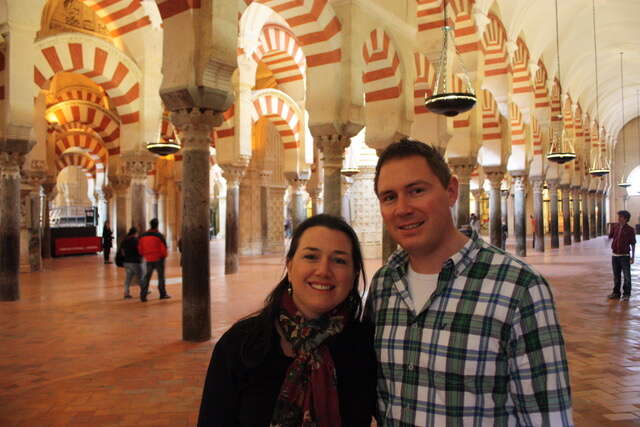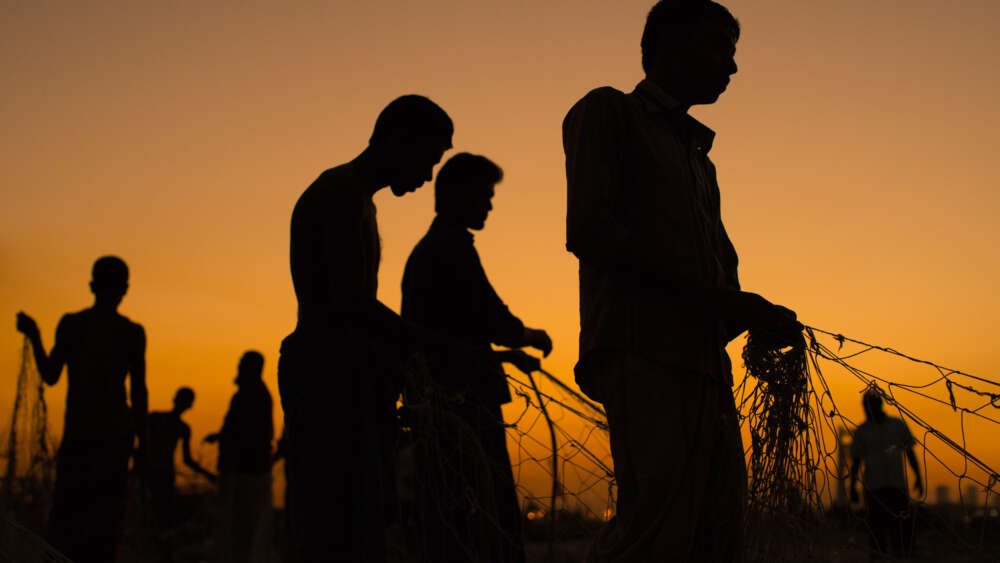Sarah Morse and her husband Stephen have seen first-hand the devastating impact of modern slavery.
The couple spent five years in Spain, where Sarah worked in a safe house for survivors of human trafficking into the sex industry. There, they were part of the charity International Teams, and also tasked with training, educating and advocating for human trafficking intervention.
During that time, Stephen – an Anglican minister – also completed a PhD in human trafficking with Fuller Seminary.
“When we came back from Spain in 2016, we had all this experience and research, and we wondered how we were going to apply that to the Australian context,” says Sarah, a registered nurse with a 20-year history in humanitarian work.
“Modern slavery affects nearly all businesses and supply chains.” – Sarah Morse
As she notes on her blog, it’s not just those overseas who make up the 46 million people currently affected by modern slavery. According to Unseen UK, modern slavery is defined as “the commodification of people for the purpose of exploitation and financial gain”, with over 60 per cent of survivors in forced labour working on farms, in factories and fisheries.
In Australia, an estimated 15,000 people work in slave-like conditions – according to the most recent Global Slavery Index – in industries such as agriculture, horticulture, mining and construction, and in retail services, like nail salons, carwashes, cleaning services and security.
The Morses are part of the Anti-Slavery Australia network, where they hear stories of people being promised jobs in Australia, only to find that their pay and conditions are way less than expected when they arrive.
One example is Abdul, a 35-year-old construction worker from Indonesia who was offered a contract in Australia at the award wage. Thinking this was an opportunity to earn money to provide an education for his four children, he came to Australia to work. However, with no English, no Australian qualifications and no safety briefing, he worked on a construction site in Canberra six days per week, earning $250 – of which $100 was taken back by his employer to cover accommodation on his remote farm. Abdul says he was not given any information about working conditions and fair rates of pay.
Yet it’s not just these companies and industries themselves that are affected, but every business that uses their products and services.
“Modern slavery affects nearly all businesses and supply chains,” says Sarah.

Sarah and Stephen Morse, founders of Unchained
So when Australia’s Modern Slavery Act 2018 came into being, Sarah and Stephen saw it as an opportunity to put their skills and passion to work to make an impact on modern slavery.
Under the Act, all companies conducting business in Australia with an annual consolidated revenue of more than $100 million must provide a yearly report on the slavery risks associated with their operations and supply chains, and state the actions they are taking to address those risks.
“We had the idea of building Unchained as a way of helping companies engage with the Modern Slavery Act in a positive way,” Sarah explains.
After two years of planning and development, the Morses officially launched Unchained Business Services at the start of 2020, along with seven other members of their team. The purpose of their organisation is to “see the Modern Slavery Act implemented in every boardroom in Australia, and to create an impact on people living in slavery”.
As well as targeting larger organisations, Unchained’s aims to reach smaller companies that are not obliged to report under the Modern Slavery Act, but have been encouraged to do so on a voluntary basis.
“Our focus is really on the companies who form a part of the supply chain to those larger corporations, earning over $100 million annually – so, small to medium businesses – and there are at least 200,000 of those,” says Sarah.
According to Sarah, there are a handful of “sustainable consultancies” like theirs in Australia– many of which combine both modern slavery and environmental sustainability consultancy. There’s also big legal and accounting firms that provide advice on compliance to the Modern Slavery Act.
“Our differentiating factor is that we offer a much deeper approach because we really care about the outcomes for the slaves at the other end,” explains Sarah.
Certainly, the Morses are doing it for love, not money, with Unchained’s profits going to the Freedom Business Alliance – a global Christian organisation that creates employment for survivors of human trafficking (and for which Stephen is a board member).
And, so far, Unchained has reached around 50 businesses with training and education about modern slavery.
“It’s very much a two-way conversation between suppliers and companies.” – Sarah Morse
“A lot of people think, ‘Oh, well, slavery is just in the fashion industry, or it’s just in chocolate’, because they’re the industries that have had the biggest press,” says Sarah.
“So we educate people about the magnitude of the problem and the pervasiveness of it. Basically, anyone who procures anything from overseas is likely to find slaves in their supply chain. It is about bringing that to light.”
They have also begun to step several companies through the process of “mapping” their supply chain – identifying suppliers who might employ the services of slaves. This is a big eye-opener for many, says Sarah.
“A lot of companies don’t know, beyond their tier one suppliers, who is in their supply chain. So we create a slavery-footprint for them.”
She clarifies: “We don’t want companies to go out and get rid of their suppliers altogether, because the ripple effects of that down the supply chain has dramatic effects on the people who are working in those factories and other places. It’s very much a two-way conversation between suppliers and companies about how they can look at cleaning up their supply chain and create better working conditions for people through it.”
Sarah advises companies to be ready for the long haul when improving their processes to minimise the risk of slavery. In part, this is because the Modern Slavery Act requires businesses to show each year how they are improving and the strategies in place to do that. But also, changes of this magnitude take time.
“The thing for companies to remember is that it’s a long process,” says Sarah. “It’s not like, ‘Oh, we’ve got slaves in our supply chain. OK, let’s fix it … We create a two to five year plan for businesses. That helps them to be a bit more realistic about what can they achieve in the next year – [which is] the next reporting period,” says Sarah.
“For people who are wanting to engage properly and actually create an impact for slaves on the ground, it’s a long process.” – Sarah Morse
“In the first year, they might just look at their policies and procedures, and whether they are set up to address the risk of modern slavery. Then the next year, they might engage with ten suppliers. Then the next year, they might engage with another 20 suppliers …
“So it’s really early days for everyone in complying with the Modern Slavery Act – for anyone who is doing it properly,” she says.
“There are companies that are just after the compliance tick, who say, ‘OK, we’ve created a statement.’ But for people who are wanting to engage properly and actually create an impact for slaves on the ground, it’s a much longer process.”
Ideally, Sarah hopes the companies Unchained works with will go beyond improving their own processes and begin to play a bigger role in ending modern slavery.
“We want companies to create a ‘shared value partnership’ with freedom organisations overseas. A classic example of this is Konika Minolta. They did a lot of work to clean up their supply chain, but then they also invested in a project in Cambodia for women coming out of trafficking. They took a team over each year to visit that project so they could see the changes that are happening there over time and the impact they are making.
“That project isn’t necessarily anything to do with selling printers and photocopiers, but it’s a way of extending their reach so they can make an impact to end slavery on the ground as well.”
She also highlights the work of Outland Denim which is doing “a really magnificent job in understanding the impact of sustainability on communities – understanding what is an appropriate wage for their workers, how that impacts the women who are working in the factory down the road, what that means for investing in their local school.”
This is where companies should be encouraged that their hard work will make a big difference, says Sarah.
“We hope to help Australian companies understand that small changes can make a really big difference to people’s lives. We’re not talking about automatically raising someone [in the supply chain’s] salary from $1 a day to $200 a day. It’s an incremental change, so by raising that person’s salary to $2 a day. Per year, that could mean that her children can afford to go to school, for example. Over time, those incremental changes will actually affect the whole community.”
“We would love to see Christian companies leading the way in complying with the Modern Slavery Act.” – Sarah Morse
And these small changes will, eventually, help to end the cycle of slavery, she adds.
“We know that for the next generation, the alleviation of poverty, hunger, access to water, healthcare and education – which are all part of the UN’s Sustainable Development Goals – will greatly impact people’s chances of not being in slavery themselves.”
As Christians, Sarah and Stephen are especially hopeful that they will be able to encourage Christian business owners to begin to address their practices and supply chains.
“We would love to see Christian companies leading the way in complying with the Modern Slavery Act,” says Morse. “It’s our constant prayer that the justice of the kingdom of God will be evident in the corporate environment.”
Want to see if your company is ready to comply with the Modern Slavery Act? Click here to take a ‘mini-gaps analysis survey’ from Unchained’s website.
Sign Petition
Unchained is encouraging NSW residents to sign a petition to have the NSW Modern Slavery Act 2018 – passed by NSW Parliament in June 2018 – brought into law.
Click here to sign the epetition.
Read more about the Act here.



